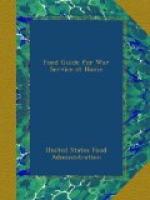Great Britain, because it could afford to import it, used about 21/4 pounds a week before the war. Germany’s consumption was slightly lower. France, Denmark, Switzerland, with fewer animals or less wealth, are small meat-eaters, the average amount being about 11/2 pounds a week—about half as much as our consumption.
MEAT AND OTHER PROTEIN FOODS
Meat is eaten partly because of its pleasant flavor and partly because it is a source of protein which is necessary to build or renew the various parts of the body. Every cell in the body contains it and needs a steady supply.
Meat is a valuable protein food, but so are plenty of others—fish, cheese, eggs, milk, dried beans, dried peas, nuts, cereals. Cottage-cheese is the most nearly pure protein of anything that we eat. We can get protein just as satisfactorily from cheese and the other animal protein foods as from meat, and almost as satisfactorily from the vegetable protein foods. THE OLD IDEA THAT MEAT IS ESPECIALLY “STRENGTHENING” HAS NO FOUNDATION. Neither is one kind of meat less thoroughly digested than another.
There is little danger in this country that our diet will fall too low in protein. Many of us eat considerably more than we need. Even those who must spend a dangerously limited amount on their diet, are not apt to be low in protein, for they often err on the side of spending an unwise proportion of their money on meat. Most scientists now consider three ounces of carefully chosen protein per day a safe allowance for an average man. An average woman needs less.
It is not at all difficult for an interested person to count up roughly whether he is eating more or less than this quantity. A small serving of lean meat or fish, about two inches square and three-quarters of an inch thick, contains about one-half ounce of protein. Two eggs, a pint of milk, a quarter of a cup of cottage-cheese, an inch-and-a-quarter cube of American cheese, each have about this same amount. So does a cup and a half of baked beans or two and a half cups of cooked cereal or six half-inch slices of bread (3 x 31/2 inches). A person eating six of these portions daily will of course have his three ounces of protein. A man moderate in his eating and patriotic in his saving of meat will probably find his consumption not far from this quantity.
THE MEAT SUBSTITUTES
Fish. The possible supply of fish is practically unlimited, and much of it is little appreciated by us. We eat on the average only 18 pounds apiece per year, though our meat consumption is 170 pounds. The British and Canadians use much more fish than we do—56 and 29 pounds respectively. The United States Bureau of Fisheries and many State colleges are constantly introducing new varieties, from shark down. We should learn to value the many kinds which are available, fresh, dried, and canned, not merely the few we happen to be used to.




